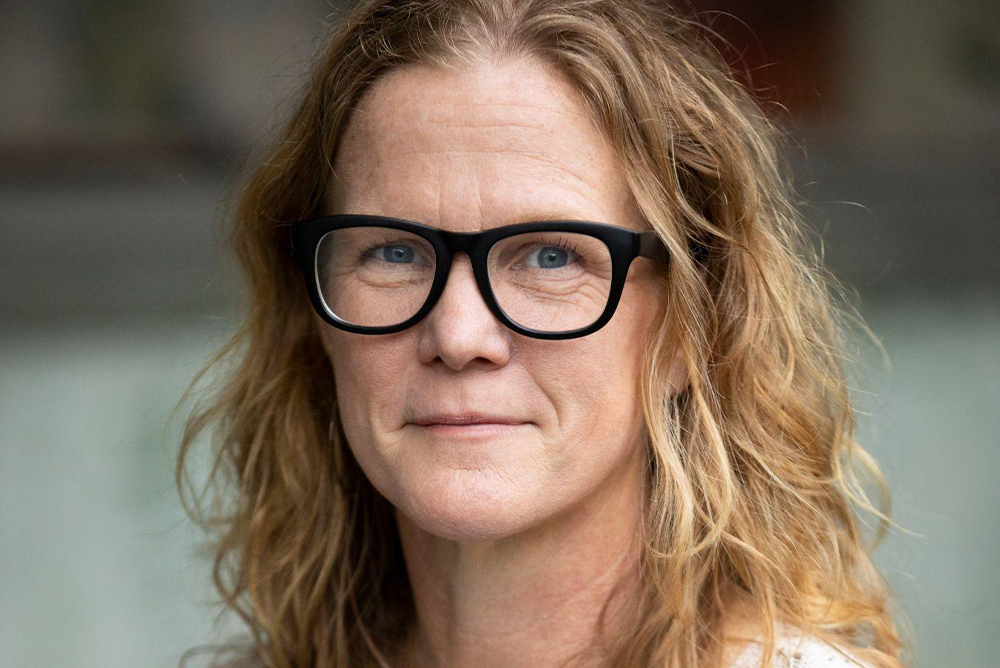
Courtesy of Jenny Browne.
Jenny Browne is a professor of English and creative writing at Trinity University in San Antonio, Texas. She served concurrent terms as the 2016-2018 City of San Antonio Poet Laureate, and the 2017 State of Texas Poet Laureate. In 2023, she was inducted into the Texas Institute of Letters. Zócalo’s poetry curator for December, Browne chatted with us about New Year’s aspirations, her hidden talent, and her advice for new poets.
How has the pandemic affected the way you think about or write poetry?
I have a new book of poems that I just finished this summer, called I Am Trying to Love the Whole World. And that title comes from a sequence of poems I wrote in the middle of the pandemic. Our worlds got very small, spatially, and I think two things happened: One, I found, even though, my days felt kind of repetitive and dulled, I was having just incredibly rich sensorial memories of the past. I found myself just writing about things that I hadn’t thought about in decades. And then, there’s a poem by Polish poet Adam Zagajewski called “Try to Praise the Mutilated World.” I wasn’t loving very much during those months that stretched into years. And I began, for a whole summer, getting up every morning and just writing one line—sort of a poem to Adam [who died in the summer of 2021]—but also to start trying to love the whole world.
Aside from the poets you’ve selected for us this month, who is a poet you’re reading currently?
Palestinian poet Mosab Abu Toha, who lives in Gaza. He has a wonderful book Things You May Find Hidden in My Ear. He writes really beautiful, distilled small poems. Everybody should read him.
2024 is coming up. What’s one of your New Year’s resolutions?
My new year is a little special this year, as I’m going to be leaving the country the first week of January to spend the spring semester in Belfast, Northern Ireland on an Irish literature Fulbright. So my new year’s hopes or aspirations are just to be back in Belfast, which is a city I love very much. And it feels like a real privilege to get to spend time with Irish poets, and Northern Irish poets in particular, and their work.
Do you have a hidden talent?
I really love listening to the mandolin. So, a few years ago I decided [to learn and play it]. I don’t really leave my living room. I have aspirations—that’s my other New Year’s aspiration—to maybe get comfortable enough to sit with [friends] playing music together and be able to play along with a few Irish fiddle tunes.
What’s your guilty pleasure TV show?
I like TV shows where handsome people with accents solve crimes. There are a lot. There’s a great one called Line of Duty that I have watched all eight seasons.
What’s the strangest job you’ve ever had?
I was working a summer part-time job at a camp in upstate New York, and I was on a trail crew where we spent a whole week clearing a creek of mosquito larva.
What’s one piece of advice you’d give to someone who wants to start writing poetry?
Read more contemporary poetry. And slow down. Poetry, at least for me, requires me to slow down, to notice, and to become aware of both language and the music of language.
As a kid, what did you want to be when you grew up?
A horse. That didn’t pan out, so here we are.
What’s a favorite food you’ve had while you were traveling?
I’ve spent a lot of time in Mexico, and I would say there’s this one churro stand in Oaxaca—it was on a particular walk, and I would go on Sunday, and it was this one stand. Honestly, it was the best churro I’ve ever had. Maybe because it was the air, maybe because it was going uphill. I would always get one and eat it walking up the hill.



